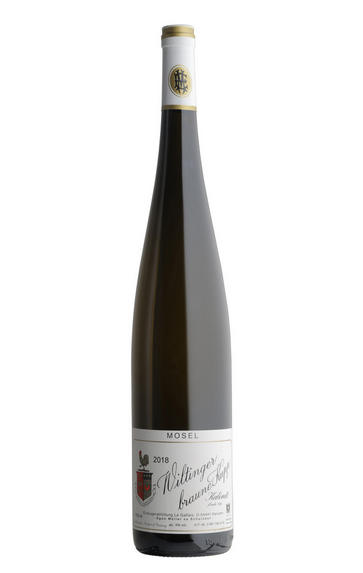
2018 Riesling, Kabinett, Wiltinger Braune Kupp , Le Gallais, Egon Müller, Mosel, Germany
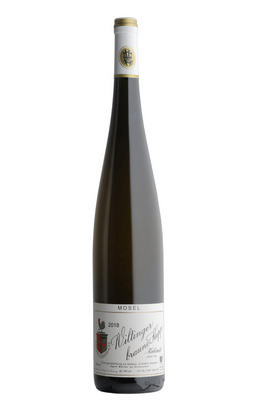
Critics reviews
The 2018 Wiltinger Braune Kupp Riesling Kabinett (AP #4) is clear and elegant on the nose, displaying ripe and dense stone fruit aromas and fine flint notes. Lush, mouth-filling and round on the palate, this is a crystalline, fine and elegant Kupp Kabinett that reveals a stimulatingly salty and a finely grippy finish. The 2018 was bottled with 9% alcohol and a quiet sweet bit of unfermented sugar.
Drink 2020 - 2040
Stephan Reinhardt, Wine Advocate (August 2019)
Purple plum is laced with mint on the nose, and those two elements serve for a succulent and subtly cooling effect on the glossy, polished palate. Tangy plum skin, piquant plum pit and a hint of seedy red raspberry serve for invigoration critical to pushing back against unusually high residual sugar, but without diminishing the sense of richness that is engendered on the first sip.
“I believe some casks would have benefited from fermenting a bit further,” noted Müller, but the fermentations simply petered out. As a result – though, naturally, must weights in the low 90s are also contributory – nearly 60 grams of residual sugar remain in the finished wine. The impressively sustained finish is amply refreshing and transparent to smoky and stony nuances.
Drink 2021 - 2032
David Schildknecht, Vinous.com (July 2020)
About this WINE
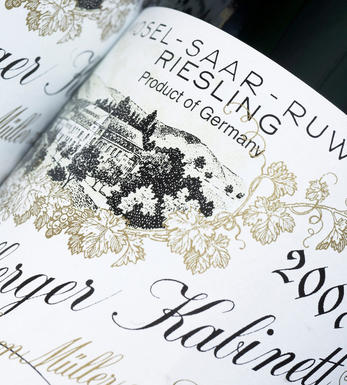
Egon Müller
The Rieslings from Egon Müller are widely recognised as amongst the very best in Germany today. He has just under eight hectares of vines in the world-famous Scharzhofberg vineyard, which includes three hectares of ungrafted Riesling vines from the 19th century.
The grapes are hand-harvested and then pressed without any skin contact before being fermented in large, 1,000-litre oak casks in the natural, deep cellars. The wines are usually bottled six months later. Müller’s sweet Rieslings are arguably the finest in Mosel, while his Kabinett and Spätlese wines are fine and elegant.
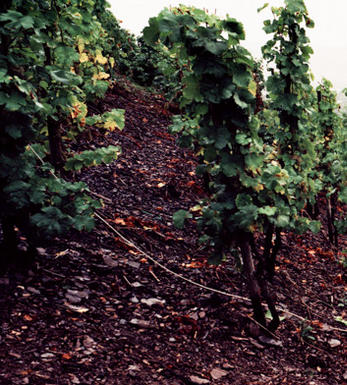
Mosel
The Mosel wine region in Germany is renowned for its high-quality white wines, especially Riesling. Its unique terroir of steep slopes, slate soils, and cool climate contributes to the wines' distinctive character.
Riesling dominates the vineyard plantings, and the region follows a vineyard classification system based on ripeness levels. Historic vineyards, such as Erdener Prälat and Wehlener Sonnenuhr, produce exceptional wines.
The Mosel offers various styles, from crisp Kabinett and rich dessert wines. The region's wine culture is celebrated through multiple festivals, making it a must-visit destination for wine enthusiasts.
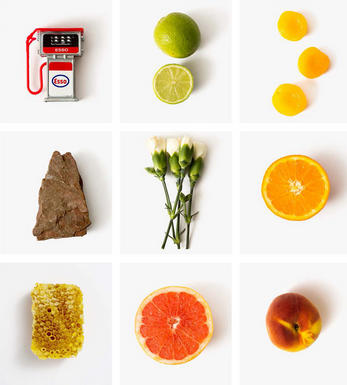
Riesling
Riesling's twin peaks are its intense perfume and its piercing crisp acidity which it manages to retain even at high ripeness levels.
In Germany, Riesling constitutes around 20% of total plantings, yet it is responsible for all its greatest wines. It is planted widely on well-drained, south-facing slate-rich slopes, with the greatest wines coming from the best slopes in the best villages. It produces delicate, racy, nervy and stylish wines that cover a wide spectrum of flavours from steely and bone dry with beautifully scented fruits of apples,apricots, and sometimes peaches, through to the exotically sweet flavours of the great sweet wines.
It is also an important variety in Alsace where it produces slightly earthier, weightier and fuller wines than in Germany. The dry Rieslings can be austere and steely with hints of honey while the Vendages Tardives and Sélection de Grains Nobles are some of the greatest sweet wines in the world.
It is thanks to the New World that Riesling is enjoying a marked renaissance. In Australia the grape has developed a formidable reputation, delivering lime-sherbet fireworks amid the continental climate of Clare Valley an hour's drive north of Adelaide, while Barossa's Eden Valley is cooler still, producing restrained stony lime examples from the elevated granitic landscape; Tasmania is fast becoming their third Riesling mine, combining cool temperatures with high UV levels to deliver stunning prototypes.
New Zealand shares a similar climate, with Riesling and Pinot Gris neck to neck in their bid to be the next big thing after Sauvignon Blanc; perfectly suited is the South Island's Central Otago, with its granitic soils and continental climate, and the pebbly Brightwater area near Nelson. While Australia's Rieslings tend to be full-bodied & dry, the Kiwis are more inclined to be lighter bodied, more ethereal and sometimes off-dry; Alsace plays Mosel if you like.


Buying options
Add to wishlist
Description
Purple plum is laced with mint on the nose, and those two elements serve for a succulent and subtly cooling effect on the glossy, polished palate. Tangy plum skin, piquant plum pit and a hint of seedy red raspberry serve for invigoration critical to pushing back against unusually high residual sugar, but without diminishing the sense of richness that is engendered on the first sip.
“I believe some casks would have benefited from fermenting a bit further,” noted Müller, but the fermentations simply petered out. As a result – though, naturally, must weights in the low 90s are also contributory – nearly 60 grams of residual sugar remain in the finished wine. The impressively sustained finish is amply refreshing and transparent to smoky and stony nuances.
Drink 2021 - 2032
David Schildknecht, Vinous.com (July 2020)
wine at a glance
Delivery and quality guarantee